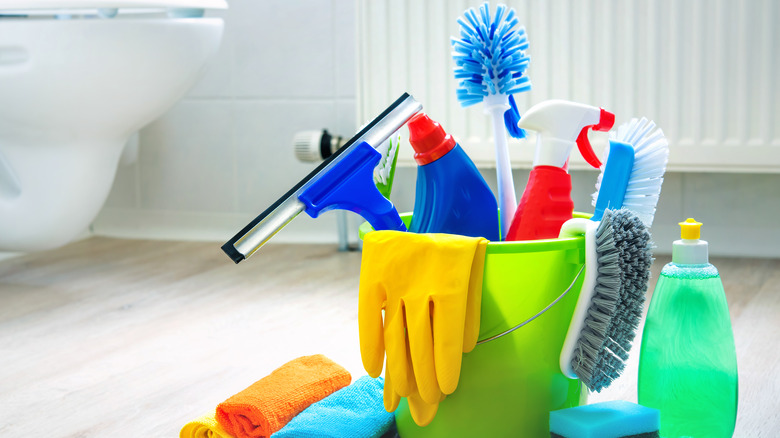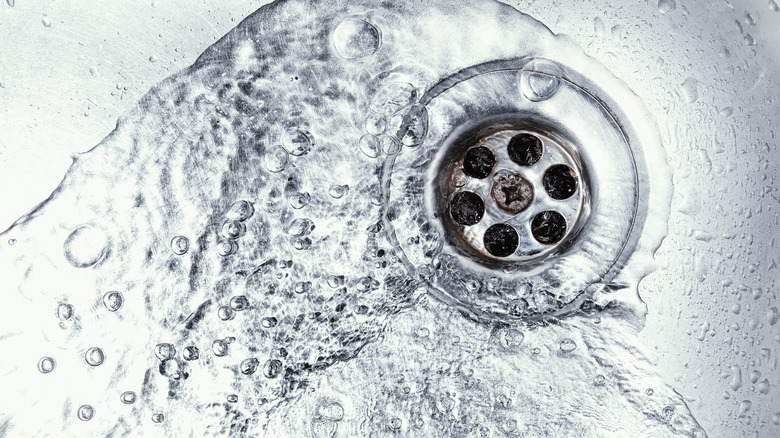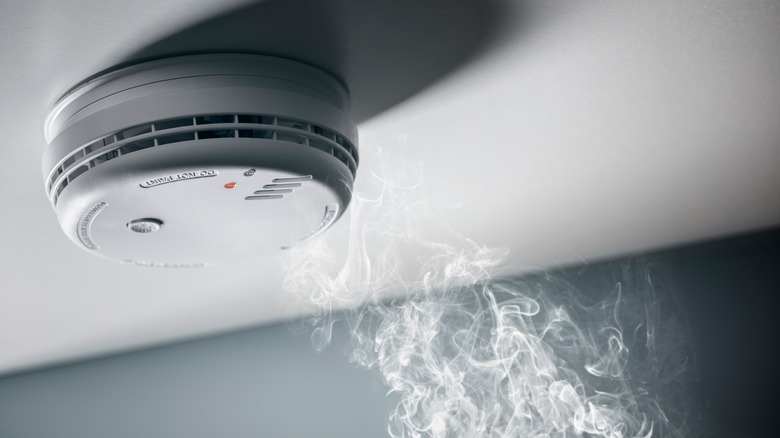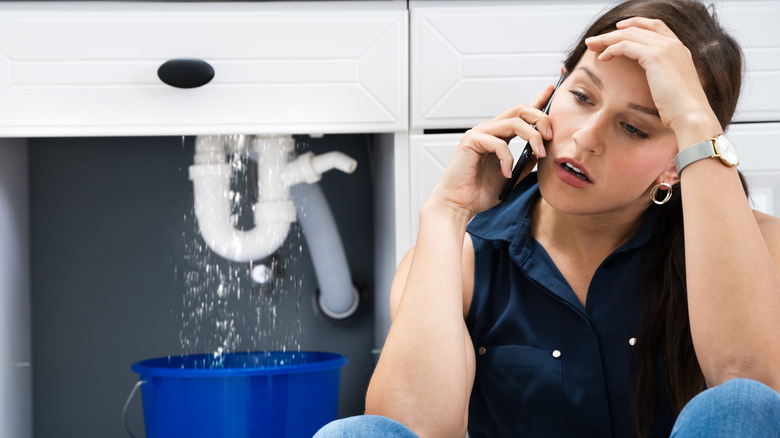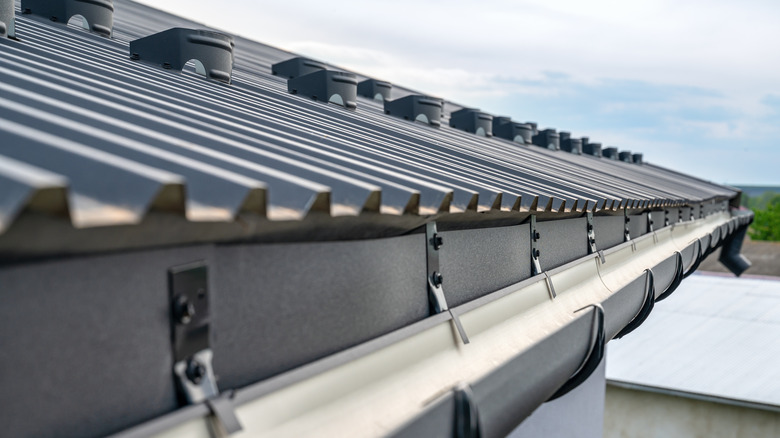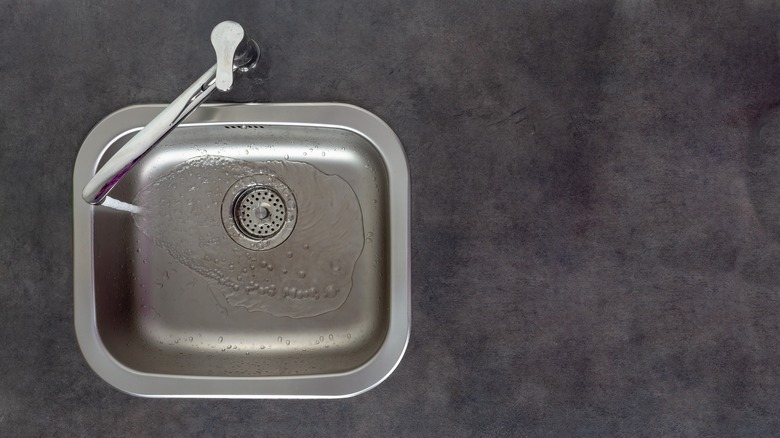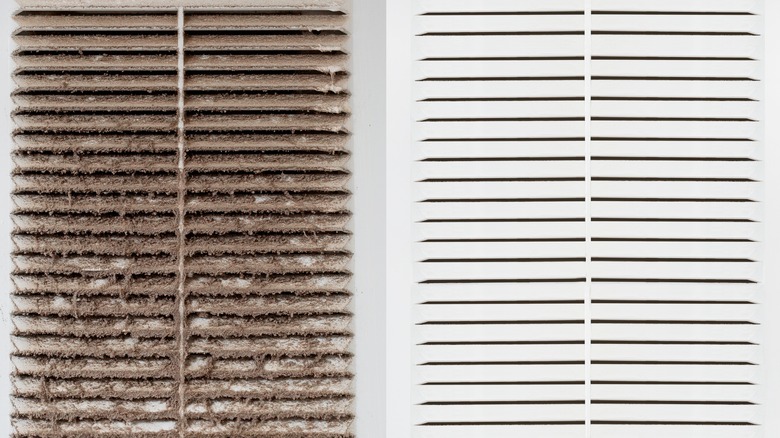10 Best Monthly Tasks To Maintain Your Home
Often when we think of home maintenance, we're likely thinking too small — daily or weekly cleans, decluttering, and the like — or too big — annual checks or, worse still, the scramble to fix things when they're already broken.
Somewhere between these two is the secret to maintaining your home — preventive monthly checks. These checks are essential for many reasons. Keeping your home running at an optimal pace and keeping surprise costs to a minimum is just two, per Landmark Home Warranty. Preventive monthly checks help you keep tabs on your outdoor maintenance, keep your interior spick and span, and even help you easily identify when your air conditioner might be too old.
However, perhaps the most crucial reason for monthly preventive maintenance checks for your home is to ensure you are safe. By monitoring all aspects of your home for any faults or possible wear and tear, you can avoid any health and safety concerns before they pile up or become bigger (via NC State Extension). Neglecting your home appliances until there is a glaring issue that needs urgent attention can cost you far more in repairs than it would have with monthly checks. Ultimately, anything you can do to reduce costs is a gift. So here are a few tasks to help keep your home running smoothly.
Restock your supplies
When your cleaning supplies run low, you re-up. However, there is an art to ensuring you're using the best cleaning options without having to spend a ton of money on them. Did you know plenty of things in your home can be used for more than their assigned purpose? For example, baking soda is a great cleaning agent. As a toilet bowl cleaner, all you need is 1 tablespoon; pour into the bowl and flush, scrubbing as you do. This is a great way to get your toilet porcelain white without using bleaches and other agents (via GoBankingRates).
Another great multipurpose agent is dish soap. Save money by buying a large bottle of your favorite soap and use it for more than kitchen utensils. Dish soap is an excellent alternative for cleaning kitchen countertops, bathroom tiles, and furniture. Add a few drops of soap to lukewarm water and use a cloth to wipe down the furniture. But be sure to do a quick test first to avoid any damages (via Dust to Dazzle Maids).
Unclog your drains
This is not a fun task, but ensuring your drain pipes are free of clutter and working optimally is necessary. Drains will catch as much residue as possible — from hair to larger dirt particles — but often things still get caught in the pipes causing an obstruction. According to Columbia Drain, ignoring a clogged drain could lead to far more unpleasant issues in the long run, such as a foul stench caused by stagnant water.
The great news is there are several easy hacks to help you through the unclogging of your drains. As mentioned before, ingredients around the home, such as baking soda, are great for even this task. But even more straightforward than that is the hot water trick. You'll need a kettle or pot of boiling water, which you can pour down your drains. This heat helps to loosen up any debris stuck in the pipes, creating a passageway for all the dirt. This is a hack you can regularly use to prevent any larger issues from building up, but be mindful not to use this on plastic or porcelain sinks and plastic pipers (via Mr. Rooter).
Check your smoke alarms
According to the U.S. Fire Administration, as many as one out of three home fires occur in homes without a working fire alarm. Such a statistic is rather alarming when we consider how easy it can be to ensure that your home's fire alarm system is functional. One of the critical things to do is to check your smoke alarm batteries every month, ensuring that the batteries still work and aren't missing. You must also test the alarm itself every month, confirming its responsiveness.
All you need to do is locate the test button on your smoke alarm, push it and hold it until the familiarly piercing sound of the alarm begins. Take note of the sound; is it too low or not shrill enough? Then it's time to replace the batteries. Do another test after this replacement to confirm that all is in working order (via Allstate). Remember your smoke alarms must be replaced every 10 years, and batteries should be replaced every six months, regardless of how it's functioning.
Check your HVAC systems
Let's start at the very beginning. What's an HVAC system, and why do you need to check it? HVAC stands for heating, ventilation, and air conditioning. These systems help air flow through your home. Routine checks on your HVAC systems help to regulate your utility bills. If your heating system isn't working effectively in the winter and you have to leave it running for longer to heat your space, you can end up with a higher energy bill. Same in the summer months. So getting a monthly check on your HVAC systems can help you keep surprise costs down, as per Valley Heating and Air Conditioning.
To ensure your HVAC is in working order, alternate monthly maintenance tasks on your HVAC. One month you can change the filter; the next, you can step outside and ensure no weeds, vegetation, or snow is blocking the unit. You can also make your rounds with the vents in the house, ensuring each is blowing properly and isn't obstructed by furniture or a window treatment. You can also check the unit's drain pan to ensure there isn't a block that needs addressing, and you can dust each of the house's vents to ensure dirt and allergens aren't being blown into the room (via Superior Mechanical Services).
Look out for any leaks
Leaks aren't always easy to spot, so routine checks are necessary. The United States Environmental Protection Agency says that, on average, leaks in the home can amount to over 10,000 gallons of wasted water annually. Checking for leaks doesn't always require getting down on your hands and knees and physically looking for holes or breaks in the plumbing. The simplest way to check for a leak is to monitor your water meter for any unusual changes in usage. The easiest way to gauge changes in water usage is to inspect your meter during a two-hour period in which no water has been used. There shouldn't be a change, but if there is, it is likely the result of a water leak somewhere. Check your faucets and pipe fittings to see if there's water outside them that can point you to your leak.
The food coloring hack is a great way to detect any toilet leaks. Your toilet is leaky if water seeps in from the tank to the bowl without flushing, but it's hard to catch since there is always standing water in the bowl. To remedy that issue, add a few drops of bright food coloring to the tank. If the bowl changes to the same color, you know there is a leak (via California Water Service). Various leaks can occur in the toilet, so be sure to look out for main issues, such as water not filling up the tank, which can mean a problem with the float ball. Conversely, a tank flowing into the overflow tube could have an issue with the valve.
Clean out your gutters, washer-dryers, and big appliances
Because certain home appliances are on the larger side, we might think they don't need as much care as the stuff we use daily. But the truth is, those more extensive home amenities need as much care and management as most other things. When we talk of big appliances, we mean everything from your washer-dryers to your refrigerators, ceiling fans, and gutters.
The National Fire Protection Association claims that dryer fires cause about $233 million in damages annually and that dryers are responsible for around 4% of home fires between 2014 and 2018. One of the causes of these fires is a failure to change out the lint traps, which can lead to lint buildup. Once a month, clean out your dryer traps to avoid any other setbacks that can arise in the home, including an eventual faulty dryer.
Your refrigerator coils should also be cleaned out once a month. If they're not adequately looked after and cleaned frequently enough, they can gather a lot of grime and dust and cause your appliance to work sub-optimally (via One Good Thing By Jillee). Similarly, your gutters should be cleaned monthly to avoid any buildup and subsequent drainage issues that may arise from clogging. Not to mention the sort of pests, including mosquitoes and other insects, that may begin to breed in such spaces (via Lee Company).
Give your home a thorough inspection
Some tasks may seem a little too big for a monthly redo but giving your home – externally, in particular – a thorough walkthrough is a great way to prevent surprise costs from springing up. Home inspections mainly occur when you're looking to buy a place or, more significantly, when you're looking to sell. You give your home a once-over to spot any potential issues that might threaten to put a buyer off. But what if you gave that energy to your home regardless of whether you wanted to sell your property? A monthly once-over of your home's external workings can help you bypass many costly surprises.
As mentioned before, we're looking at ways to prevent little molehill-sized hiccups from becoming mountainous problems down the line. According to Angi, by inspecting your property, you can catch these potential issues early, thus saving you the headache and the massive bill associated with complete breakdowns of appliances or bursting pipes.
Another advantage of a walkthrough is getting a professional to inspect areas of your home that you might not want to (or places you might not even know to look). The truth is, not every hitch has to be fixed immediately, but it's good to be aware of things that might evolve into hiccups later.
Clean your garbage disposal
Sure, a lot of these tasks might seem unpleasant, but there are a lot of hacks that can make them less tedious for you. You'll want to do a deep clean with a garbage disposal to ensure all debris is removed from the chute. Home Depot notes that one of the first things to do is to examine the drain for any chunks that might be stuck. Ensure that your disposal is turned off, and avoid using your hands to remove debris. Instead, get a long stick, a pair of pliers, or tongs that can reach the piece of garbage that's in the way. Once you've removed the larger particles, fill the chute with hot water to flush out the passageway.
In the time between cleans, it's important to avoid clogging the drain with things like grease, coffee grounds, eggshells, and plastic, as these will cause damage to the unit as a whole and cost you more to fix.
Pay attention to your hood filter
Many filters suffer from neglect, and the range hood filter can be one of the most ignored vents in the home. The great thing about this, as with most tasks on this list, is that you don't need to spend money to clean these appliances and fixtures thoroughly. For this, the old faithful dish soap comes in handy. In addition, you'll need a washcloth and a scrub brush. A toothbrush or scouring sponge scrub will work fine.
According to Kitchn, the process is as simple as ever: Place the boiling water in a big enough tub to fit the filter, add a dash of dish soap — don't forget a little goes a long way with this — and place the dirty filter in. Let this soak for some time, and then go at it with the scrub, applying enough pressure to get rid of some stickier stains.

